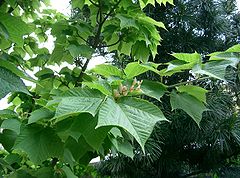Acer rufinerve
| Habit | tree
| |
|---|---|---|
| Height: | ⇕ | 40 ft"ft" can not be assigned to a declared number type with value 40. |
| Width: | ⇔ | 35 ft"ft" can not be assigned to a declared number type with value 35. |
| Lifespan: | ⌛ | perennial |
| Bloom: | ❀ | early spring, mid spring, late spring |
| Exposure: | ☼ | sun |
|---|---|---|
| Features: | ✓ | deciduous |
| USDA Zones: | 5 to 8 |
|
Acer > |
Acer rufinerve (Redvein Maple or Honshū Maple), is a maple in the snakebark maple group, related to Acer capillipes (Kyushu Maple). It is native to mountains forests of Japan, on Honshū, Kyūshū and Shikoku.[1][2][3][4]

It is a small deciduous tree growing to a height of 8–15 m, with a trunk up to 40 cm diameter. The bark on young trees is smooth, olive-green with regular narrow vertical pale green to greyish stripes and small greyish lenticels; on old trees, it becomes rough and grey. The leaves are three-lobed (occasionally five-lobed with two additional small basal lobes), double serrated, 8-16 cm long and 6-16 cm broad, matt to sub-shiny dark green above, paler below with small tufts of rusty hair on the veins when young, becoming glabrous when mature; the petiole is greenish (rarely pinkish), 3–5 cm long. The leaves turn to bright orange or red in the autumn. The flowers are produced in racemes 10 cm long, each flower 8–10 mm diameter, with five yellow to greenish-yellow sepals and petals; it is dioecious, with male and female flowers on separate trees. The fruit is a paired samara 2–3 cm long with rounded nutlets. The scientific and English names derive from the reddish down on the veins, the Japanese name from the bark pattern.[1][2][3][5]
It can be distinguished from the related Acer capillipes (Japanese, ホソエカエデ hosoekaede), with which it often occurs, by the green petioles, the rufous hairs on the underside of the leaves (contrasting with the hairless or only thinly hairy A. capillipes leaves), and in flowering earlier in spring at the same time as the leaves appear.[2]
This is one of the most commonly planted snakebark maples, and is a hardy, fast grower. It does not display much variation as a species but a notable cultivar is 'Erythrocladum' with yellow-green in both its leaves and the stripes of its bark. Variegated cultivars include 'Albolimbatum' and 'Hatsuyaki'.[3][6]
Read about Acer rufinerve in the Standard Cyclopedia of Horticulture
|
|---|
|
Acer rufinerve, Sieb. & Zucc. Tree, to 40 ft., with striped bark: branches glaucous when young: lvs. rounded at the base, 3-lobed, 3-5 in. long, doubly serrate, ferru- gineously pubescent on the veins beneath when young: racemes ferrugineously pubescent: fr. short-stalked; wings spreading at right angles. Japan. Var. filbo-limbatum, Hook. Lvs. edged with white. CH
|
Cultivation
- Do you have cultivation info on this plant? Edit this section!
Propagation
- Do you have propagation info on this plant? Edit this section!
Pests and diseases
- Do you have pest and disease info on this plant? Edit this section!
Species
Gallery
If you have a photo of this plant, please upload it! Plus, there may be other photos available for you to add.
References
- Standard Cyclopedia of Horticulture, by L. H. Bailey, MacMillan Co., 1963
External links
- w:Acer rufinerve. Some of the material on this page may be from Wikipedia, under the Creative Commons license.
- Acer rufinerve QR Code (Size 50, 100, 200, 500)
- ↑ 1.0 1.1 Kobe city: Acer rufinerve (in Japanese; google translation)
- ↑ 2.0 2.1 2.2 Kanagawa Prefecture trees and shrubs: Acer rufinerve (in Japanese; google translation). Archived 2009-10-24.
- ↑ 3.0 3.1 3.2 van Gelderen, C. J. & van Gelderen, D. M. (1999). Maples for Gardens: A Color Encyclopedia
- ↑ Germplasm Resources Information Network: Acer rufinerve
- ↑ Rushforth, K. (1999). Trees of Britain and Europe. Collins ISBN 0-00-220013-9.
- ↑ Hort Net: 'Hatsuyaki'

